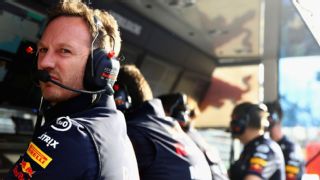|
Following the latest round of meetings to discuss Formula One's 2021 regulations, Red Bull boss Christian Horner has urged the sport to consider the impact a cost cap would have on jobs in the motorsport industry in the U.K. The idea is simple: level the playing field between F1's biggest and smallest teams by restricting budgets to $150 million per year across the board. Marketing budgets and the salaries of drivers and team executives would not be included in the cost cap, but development budgets for the car, which currently vary by over $200 million between the biggest teams and the smallest would. The budget cap would be part of a package of rules aimed at reducing expenditure, making racing more exciting for fans and closing the gap between the front and back of the grid. A budget cap is central to the plans and was proposed to the teams in April this year before the sport's owners followed up on its plans with the teams in Monaco. After attending the meeting Horner, whose Red Bull team is estimated to run on a budget of $285 million, warned that a budget cap would result in thousands of jobs being cut across the UK motorsport industry -- both at top teams and among their network of suppliers. "I think they [Formula One] are gathering feedback at the moment and the more things that they look at the more questions it raises," he said. "Of course there has to be an extremely responsible approach from the governing body and the commercial rights holder because, certainly within the UK, you are talking about potentially thousands of jobs.  "If a local car plant or Tesco's is shut it makes the headline news at the moment, so I think there is a social responsibility that needs to be taken into account when you are talking about restrictions and caps and so on. It doesn't sit well when drivers can earn, in some cases, up to $50 million a year, how many jobs is that worth? "The whole thing needs to be looked at quite carefully. I think the FIA and Liberty are aware of that and yet I still stick to the belief that the biggest cost drivers in our business are the regulations, both sporting and technical. There is a responsibility that needs to be given serious consideration as to how these regulations are implemented." Mercedes is another team that would have to downsize significantly under a cost cap and currently has an estimated budget of around $380 million, excluding its engine department. Yet Mercedes team principal Toto Wolff is confident F1's owners Liberty Media recognise the need for a glide path to allow teams to reach the budget cap without a sudden cull of jobs. "This was a very good point where Liberty recognised that a cost cap cannot be an event but needs to be a process," he said in Monaco. "It needs to go over several years and it needs to consider the various structures that have been put in place. They are taking our feedback on board and it is clear that we will all be protecting our structures in a way -- we have all expressed that to them." McLaren, a former championship contender but now a midfield team, is closer to meeting the proposed $150 million cap than the likes of Ferrari, Mercedes and Red Bull, and executive director Zak Brown has thrown his support behind the wider package of changes for 2021. "Yeah, I think they put forward conceptually all the right ideas. The devil is in the detail as the phrase goes. The engine regulations, we don't make engines so we probably have less of a view there other than I like the cost element that they're proposing. So I'm a fan of reduced cost. "The revenue [split from F1 to the teams] that they've presented is more balance, so that looks to be going the right way, and then regulations to try and make racing closer and a cost cap. Of course everyone has their own views on whether that can be managed or how that can be managed but I think everyone has a good sense of what to look for on areas in which people might push the envelope, but I ultimately think it's manageable. So I think what they presented in [the initial meeting in] Bahrain is the right direction for the sport."
|
